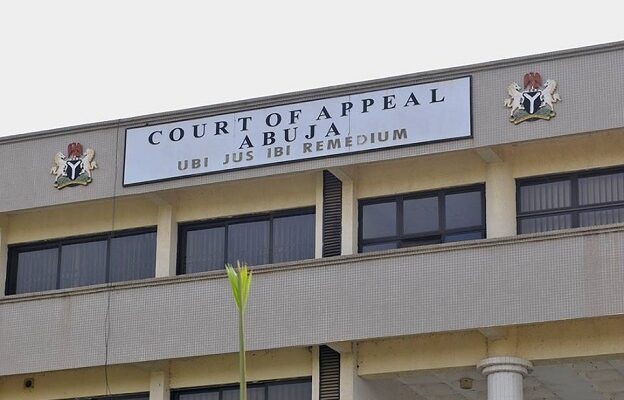The Court of Appeal in Abuja, on Monday, upheld the conviction of a security man, Macaulay Masayete, earlier found guilty by the trial court of raping a female student at the Kogi State Polytechnic, Osara Campus in September 2018.
The Kogi State High Court had in 2019 found guilty of raping an 18-year-old undergraduate of the polytechnic.
Consequently, the court sentenced the convict to 10 years’ imprisonment. But, Mr Masayete who was 39 years old at the time of the offence, approached the appellate court to have his conviction overturned. He denied raping the teenager.
On Monday, a three-member panel of the Court of Appeal led by Joseph Oyewole, in a unanimous judgement, agreed with the trial court’s findings and affirmed the guilt of Macaulay Masayete.
“My lords, I agree with the learned trial judge that the evidence of PW1 (survivor) is clear and unambiguous,” Okon Abang, a member of the panel, said in his lead judgement agrees to by other panel members
Reviewing the evidence before the trial court on Monday, the Court of Appeal recalled the horrific experience of the undergraduate at Mr Masayete’s hands on the night of 13 September 2018.
“He (Mr Masayete) dragged me across the road and tore my clothes and forced himself and had carnal knowledge of me. After that he said I did not satisfy him and he demanded N10,000. He deflowered me, he also intimidated me with a cutlass,” the justice recalled the survivor’s testimony before the court in Kogi State.
To substantiate the allegation against Mr Masayete, the justice said the prosecution needed to prove three major ingredients of the case.
Mr Abang noted that the prosecution proved beyond reasonable that the watchman had sexual intercourse with the student whom he was meant to protect.
He further held that the sexual intercourse between the convict and the teenager was not consensual, and that there was no evidence to show that Mr Masayete and the student were married.
“The appellant failed to challenge the documentary proof and oral evidence given by PW1 (survivor) against him. The trial court was right in believing the survivor that indeed the appellant had sexual intercourse with the survivor.”
The justice agreed with the trial court that the evidence of a medical doctor corroborated the fact that the student was raped.
“At the clinic, I examined her and noticed bruises on both shoulders. I examined her vagina and observed that there was penetration,” the doctor had testified at the lower court.
“In conclusion, the appellant’s sole issue is hereby resolved in favour of the respondent against the appellant. The appeal lacks merit and it is accordingly dismissed. The judgement of the trial court dated 11 December 2019 is hereby affirmed,” Mr Abang said.
On 13 September 2018, the undergraduate was at the polytechnic’s Utility Hall reading alongside other students when there was a power outage around midnight.
As the teenager was about to leave the hall, Mr Masayete arrived and picked a quarrel with her reading partner.
In the process, there was a scuffle that led to the breaking of Mr Masayete’s torchlight.
Subsequently, the watchman insisted that his broken torchlight must be fixed by the two students.
While the male student left the hall to get some money to pay for the damaged torchlight, Mr Masayete whisked the teenage girl away from the reading hall to another building across the campus where he raped her.
The survivor testified that Mr Masayete wore a condon before he raped her.
In his analysis of evidence before the court, the justice said Mr Masayete “tortured and physically harassed” the teenager.
Mr Abang recalled Mr Masayete’s confessional statement where he admitted raping a girl four years before the September 2018 incident involving the undergraduate.
“The appellant voluntarily confessed having raped a girl four years before 13 September 2018. This statement was admitted in evidence without the objection of the appellant. This is a confessional statement that was given without any form of coercion.”
He said Mr Masayete’s conduct demonstrated “crass deprivation of moral rectitude.”
The justice said Mr Masayete was employed as a watchman to protect the students, but he decided to abuse the helpless situation of the survivor.
In his defence, Mr Masayete said he caught the teenager having sexual intercourse with her reading partner inside the hall when electricity went off around midnight on 13 September, 2018.
He told the court that the two students pleaded with him not to report the “indecent conduct” to the polytechnic authorities as they were willing to do anything to settle the matter.
The convict further said he confiscated the students’ mobile telephones and their clothes after taking their photographs.
In one breath, the watchman said he left the hall to the security office on the school campus, but in another breath Mr Masayete said he went to the school clinic for surveillance after the incident at the hall.
Evaluating his evidence, Mr Abang said the convict was not a witness of truth.
The judge said Mr Masayete’s testimony was filled with inconsistencies.
“It is my view that the appellant is not a witness of truth. He said he went to the clinic for surveillance and in another breath said he went to the security office. The appellant had the intention to have sexual intercourse with the survivor.”
On 15 May 2018, Mr Masayete was arraigned before the trial court for the offence of rape.
The offence was was said to violate section 283 of the Penal Code.
He pleaded not guilty to the offence.
In order to discharge the burden of proof placed on it by Section 135 of the evidence Act 2011, the prosecution called five witnesses including the rape survivor; (name withheld to protect her identity), Isah Jibrin, a medical doctor; and Matthew Yakubu, a police officer.




